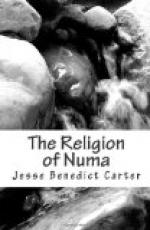In the main the foreign wars of the second century before Christ gave place to the Civil War at home, but there was one exception to this, the war with Mithradates, king of Pontus, which on various occasions during the early part of the century took large bodies of Romans to the Orient. And as though to supplement this knowledge of the East, in the closing half of the century the field of the civil struggle was enlarged so that it too included the East and South-East. We have already seen so many instances of the effects of political events on the course of Roman religion that it is a matter of no surprise to us to see that both of these struggles, the Civil War and the Oriental wars, left their marks on religion. It would be much more surprising if they had not done so. In the struggle of the rivals at home every possible weapon was employed, and it was soon discovered that the priests and the paraphernalia of religion were excellent means of political power and influence. The religion of the state therefore became enslaved to politics. On the other hand the campaigns in the East made the soldiers, and eventually on their return the whole populace, acquainted with various Oriental deities, which helped to satisfy their craving for the sensational and the superstitious. Thus while the state religion in its debauched condition was losing influence, the orgiastic element in worship was gaining power through these newly acquired Oriental cults. The story of the religion of the last century of the republic is accordingly the history of the control of state religion by politics and its consequent destruction, and the growth of superstition because of the coming of new Oriental worships; and we may add to these two topics a third: the pathetic attempts of philosophy to breathe new life into the dead religion of the state.
When it comes to the question of the human characters whose names are writ large on this page of religious history, the Dictator Lucius Cornelius Sulla towers above all others. To his political insight is largely owing the harnessing of the state religion to the chariot of the politician, now and hereafter; and it was he who was the foremost leader of Roman armies to the Orient, and the man who, because of his peculiarly superstitious character, encouraged the worship of the strange deities which were found there. In both these directions he was ably seconded by Pompey, half a generation later. On the other hand the futile efforts of philosophy to improve the situation were inspired during the earlier period by the chief priest Scaevola, a contemporary of Sulla, and during Pompey’s and Caesar’s time by Varro, the greatest scholar that Rome ever produced.




